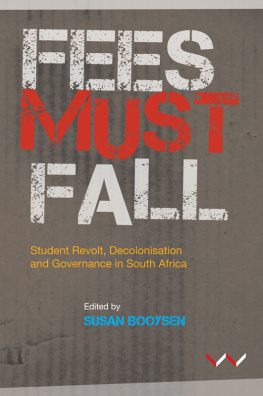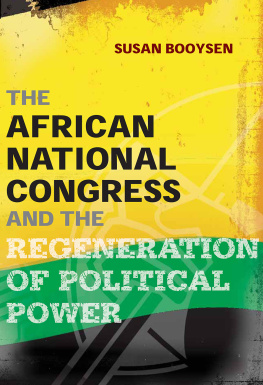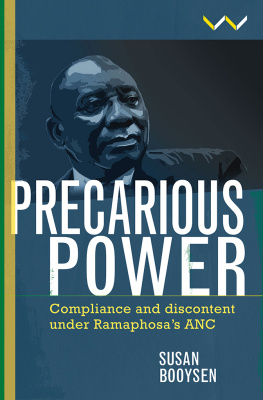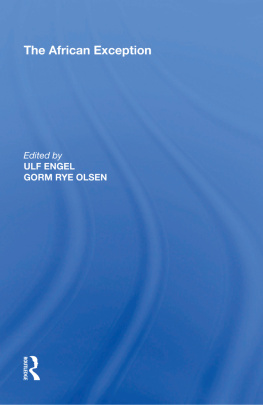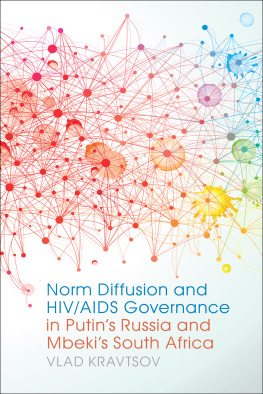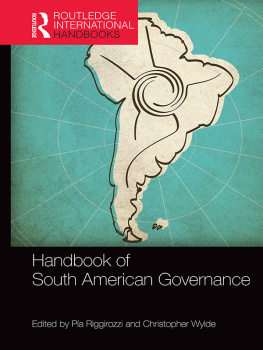Published in South Africa by:
Wits University Press
1 Jan Smuts Avenue
Johannesburg 2001
www.witspress.co.za
First published in South Africa in 2016
Chapters Individual contributors 2016
Images Individual copyright holders
ISBN 978-1-86814-985-8 (Print)
ISBN 978-1-86814-986-5 (Web PDF)
ISBN 978-1-86814-987-2 (EPUB North and South America and China)
ISBN 978-1-86814-988-9 (EPUB Rest of World)
All rights reserved. No part of this publication may be reproduced, stored in a retrieval system, or transmitted in any form or by any means, electronic, mechanical, photocopying, recording or otherwise, without the written permission of the Publisher, except in accordance with the provisions of the Copyright Act, Act 98 of 1978.
Project managed by Hazel Cuthbertson
Edited by Monica Seeber
Proofread by Alison Lockhart
Indexed by Miri van Rooyen
Cover designed by Hothouse South Africa
All royalties from the sales of this book will be paid into the Wits School of Governances beneficiary fund for deserving students.
T he authors and editors special thanks go to the individual internal readers, Wits School of Governance (WSG) colleagues and those further afield at Wits and the University of Johannesburg, for making time to do a first-round of internal, collegial assessments: Kelly Gillespie, Gillian Godsell, Lynn Hewlett, Darlene Miller, Merle Werbeloff, David Everatt, William Gumede, David Moore and Horcio Zandamela, besides editor Susan Booysen. We all juggled our lenses as we careered between scholarly secondary voices and activist primary voices, found different balances between the two, and generated a body of interpretations and knowledge that we hope will stand the test of time. In many instances we agreed to disagree on the character of the revolt and the justification of the modus operandi. We hope that the result, this book, will stand as a benchmark that captures the richness of interpretations of what unfolded in October 2015 and beyond, and continue to ring out as the inevitable next rounds unfold.
We thank the anonymous Wits University Press reviewers who engaged with the manuscript and went beyond the call of duty to offer insights, critiques and valuable direction for the further development of the manuscript. We trust that the elaborations, elucidations and further anchoring added to the final version has helped capture your respected advice.
Most of all, we, as scholars, thank the student authors as activist-intellectuals for their brave steps to help capture in writing the spirit of the changing times. This volume is merely a first chapter the final chapter to the unfolding student revolt still needs to be written. We at WSG look forward to playing a role in the coming of age of a new generation of scholars, one that might bring the dreams of South Africas 1994 and the aspirations of many different generations of left and new left students and scholars closer to fruition.
David Everatt
Head of School, Wits School of Governance
F aced with major and rapid social change, especially when led by students, academic responses vary from diving in holus-bolus to wait and see, with many points and ways of behaving in-between, which may include participant observation, non-participant observation, activist-scholarship, embedded scholarship, disinterested observer, hostile critic, and so on. All are open to challenge, and all hold dangers: a loss of historical or of contemporary perspective; a failure to grasp detail or significance, or to distinguish them in the hurly-burly of the everyday; a failure to capture the lived fabric and significance of a social movement; and of course the ad hominem judgements, aimed at those not in the charmed circle, or those too deeply in the charmed circle, or those too critical, too uncritical, with the wrong politics, the wrong class, the wrong skin colour, and so on.
These academic scuffles are not merely vicious, as Henry Kissinger (among many others) had it, because the stakes are so low in the academy quite the opposite. Controlling the narrative is key in any struggle, most particularly in the era of tweets and texts, and in particular for youth-led struggles, normally demonised by elders and erstwhile betters. As the #FeesMustFall movement took shape, controlling the narrative was critical given the movements decision to try to avoid high-profile individual leaders who would normally set and manage the narrative the ways in which the goals of the struggle are explained to the public, to the core constituency and to its opponents. This book is not an attempt to take control of the narrative. Embarking on a book about the student movement of 2015, we faced many of the dangers above, and only the reader can judge whether the authors negotiated the many pitfalls facing them. The book makes no apologies for making judgements on many aspects of the various #Fallist movements. As Susan Booysen makes clear in the Introduction, this book is a scholarly assessment of a key moment in post-apartheid South Africa. It is not an attempt to snatch away the narrative, to substitute a more moderate alternative, modulated by elders. It began in the heady days when government backed down in the face of an organised, insistent and compelling student-led struggle whose narrative of legitimate need driven by inequality in the face of a government deeply mired in corruption allegations was one that we felt deserved academic analysis, and academic space for students to articulate their own understanding of what they had just achieved, as much as for academic practitioners to reflect on what had occurred.
Given the speed of change in contemporary South Africa, we have no idea what may be happening by the time this book is printed and available to readers. The Wits School of Governance offers it as a small contribution to understanding why change is so urgently needed, and how it may be brought about.
Susan Booysen
W hat did the student revolt of late 2015 to mid-2016 mean for governance in South Africa? How did it affect higher education and national government?
This book dissects the influence of the days of revolt that shook the government. Its voices are those of primary activists and scholars. The books reflections represent a mere snapshot in time, and we reflect on only a segment of the overall revolt and its impact. The analysis for this volume ends in mid-2016, as disillusionment with the implementation of early gains sets in; as a second cycle of revolt unfolds; and as government and university managements work to persuade a diverse and still-angry student generation that more profound change is on the way.
The students renewed objections and challenges to the prevailing sociopolitical order embodying tales of alienation, of anger and of rejection of much of the status quo ante reverberate as this book goes to print. Our relatively early analysis covers the first months of the #FeesMustFall (#FMF) movement. The events of October 2015, along with the 2016 aftermath, deserve in-depth, contextualised consideration. Multiple controversies colour the ongoing developments not all students, for example, agree on the extent of rejection of the preceding and prevailing orders, nor do all pursue the outstanding goals with equal fervour. We analyse a moving target. Our need for a deeper understanding prevails over the temptation to stall, in order to see what will happen next. The next (and we are certain that there will be further developments) will be just as important to analyse. We hope to continue listening and interpreting.



